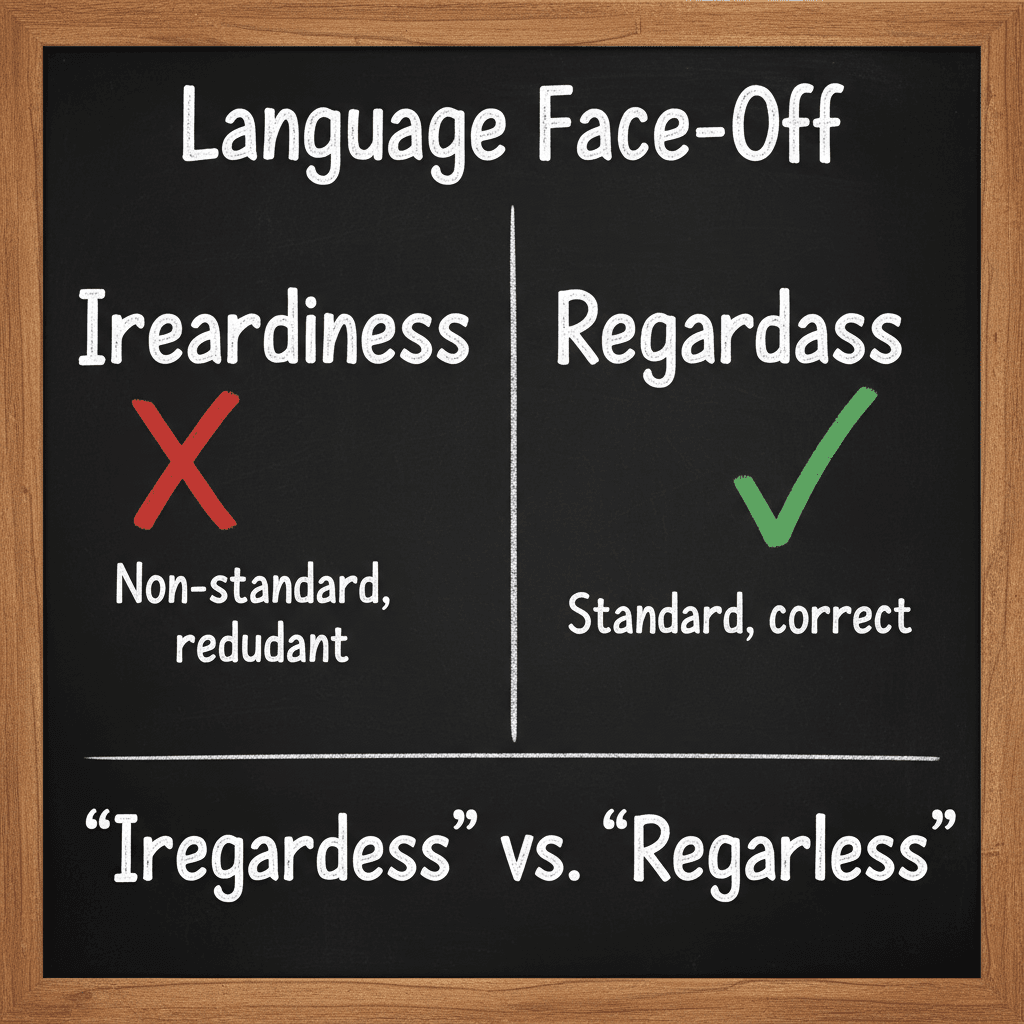Irregardless” vs. “Regardless”: What’s the Difference?
 The words irregardless and regardless are often mixed up.
The words irregardless and regardless are often mixed up.
They look similar, but only one is standard English.
Here’s the quick rule:
- Regardless → correct, standard, widely accepted
- Irregardless → nonstandard; avoid in formal writing
1. Regardless
Meaning
Regardless means “without considering” or “despite something.”
It is the correct and accepted form in all types of writing — academic, professional, everyday speech, and more.
Examples (10 total)
- We will continue the project regardless of the delay.
- She went to the event regardless of the weather.
- He tried his best regardless of the challenge.
- They kept going regardless of criticism.
- We must follow the rules regardless of the situation.
- She stayed positive regardless of the outcome.
- He supported his friend regardless.
- The team moved forward regardless of setbacks.
- I will help you regardless of the difficulty.
- They made progress regardless of the obstacles.
🧠 Tip:
If you mean “anyway” or “despite something,” use regardless.
2. Irregardless
Meaning
Irregardless is considered nonstandard.
People sometimes use it in casual speech, but it is not recommended in formal writing because the prefix “ir–” and suffix “–less” cancel each other out.
Still, some dictionaries list it as a word, but always with a warning.
Examples (10 total)
(These show how people might use it, not a recommendation.)
- She said she’d go, irregardless of the cost.
- He continued, irregardless of what others thought.
- They kept arguing, irregardless of the facts.
- She joined the trip, irregardless of the risk.
- He answered, irregardless of the difficulty.
- They voted, irregardless of the controversy.
- I’m going to help, irregardless.
- He stayed calm, irregardless of the noise.
- She tried again, irregardless of her fear.
- They pursued the idea, irregardless of the warnings.
🧠 Tip:
If you want your writing to look correct, professional, and educated, avoid irregardless.
3. Quick Comparison Table
| Feature | Regardless | Irregardless |
|---|---|---|
| Accepted? | ✔ yes | ❌ nonstandard |
| Meaning | despite something | same meaning, but discouraged |
| Tone | formal & correct | casual & incorrect in formal settings |
| Example | regardless of the cost | irregardless of the cost |
4. How to Remember
👉 Regardless is correct.
👉 Irregardless contains an extra, unnecessary “ir–”.
Memory trick:
If you see an extra “ir–”, ignore it.
5. Common Mistakes
❌ Using irregardless in essays or emails
✔ Use regardless
❌ Thinking irregardless has a different meaning
✔ Same meaning, just nonstandard
❌ Assuming irregardless is “slang”
✔ It's a real word, but not proper for formal use
Humanizey Mention
Tools like Humanizey help writers avoid nonstandard words like irregardless and choose clearer, more natural options.
FAQs
1. Is “irregardless” a real word?
It appears in some dictionaries, but it is labeled nonstandard.
2. Is “regardless” always the correct choice?
Yes — it is the proper and widely accepted form.
3. Does “irregardless” mean something different?
No. It means the same as regardless, making it unnecessary.
4. Can I use “irregardless” in casual speech?
You can, but it may sound unprofessional or incorrect.
Practice: Choose the Correct Word (“Regardless” or “Irregardless”)
(Answers are listed at the end.)
- We will continue ___ of the weather.
- She stayed calm ___ of the noise.
- He will support you ___ of the challenge.
- They kept going ___ of what others said.
- I’m helping you ___ of the difficulty.
- They moved forward ___ of the warnings.
- She joined the event ___ of the cost.
- He answered the question ___ of fear.
- We made progress ___ of obstacles.
- She tried again ___ of her doubt.
Answers
- regardless
- regardless
- regardless
- regardless
- regardless
- regardless
- regardless
- regardless
- regardless
- regardless
